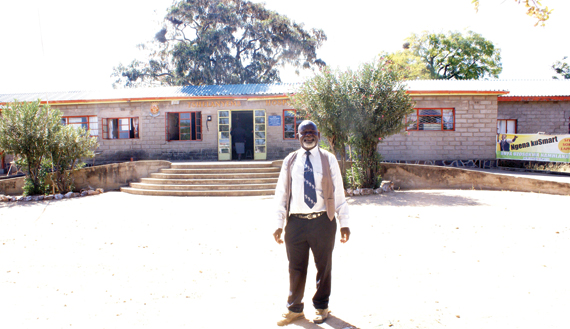
HEALTHCARE in rural Kezi, Matabeleland South, is in free-fall with villagers having to grapple with limited access to services and manpower problems being the most critical aspect of the shortages.

SILAS NKALA STAFF REPORTER
Tshelanyemba Hospital in the Motobo district of Matabeleland South is a typical example of a rural health facility that is failing to provide patients with urgent attention they need to stay alive.
The hospital infrastructure, from the buildings to the equipment, are on life support and this sometimes means patients admitted at the facility die more often than getting assistance.
The facility does not have an intensive care unit to provide patients with the urgent attention they need to stay alive and it is always poor villagers that live far from cities who are dying.
Patients struggle to access care and often get to Tshelanyemba Hospital when they are extremely sick – they are sometimes killed by diseases that are easily treated in more resource-rich areas.
The poor road network and great distances involved in accessing healthcare and lack of clean water also limit efforts to get assistance.
Tshelanyemba also lacks the most basic of medical apparatus.
- Chamisa under fire over US$120K donation
- Mavhunga puts DeMbare into Chibuku quarterfinals
- Pension funds bet on Cabora Bassa oilfields
- Councils defy govt fire tender directive
Keep Reading
The situation at the hospital has been worsened by the blackout that enveloped the facility following the theft of Zesa copper cables which also triggered a water crisis.
The Salvation Army Church-run hospital has now gone for more than a month without electricity and running water and this has ultimately rendered it dysfunctional as no seriously ill patients are being admitted.
Instead, those serious conditions are referred to Maphisa Hospital, 50km away.
Tshelanyemba Hospital administrator Major Edwin Jeremiah told Southern Eye last Thursday that they were bedevilled by a serious crisis and the blackout hampered service delivery prompting the institution to refer patients to Maphisa Hospital.
“We have had no electricity for some time and because of that, the pump that supplies running water to the hospital has been damaged,” Jeremiah said.
“We have no water and this makes us not able to cater for critically ill patients and we refer those who are seriously ill to Maphisa Hospital. That is the problem we have.”
When a Southern Eye crew visited the hospital on Thursday, there were few patients going in and out of the facility to get tablets. It appeared deserted and out of use and most people looked dejected after being referred to Maphisa.
A hospital official who identified herself as Major Meda refused Southern Eye access into storage facilities and the mortuary. She also barred the crew from talking to patients.
However, a villager who had visited the hospital, Siyangaphi Elias Maphosa, said the electricity problem at the institution had affected them as they could not afford to travel to Maphisa where they were being referred.
“We have a serious problem here. There has been no electricity for about two months now and we are being forced to take our sick relatives to Maphisa and St Joseph’s hospitals or Bhewula Clinic for treatment,” he said.
“Imagine a health facility operating without water? It means there is nothing that can really be done here so it’s as good as we have no hospital here; Tshelanyemba Hospital is just buildings and that is not helping us in any way.”
He said what exacerbated their situation was that it is not easy to get money in rural areas to enable them to travel to the next health facility.
Another villager Majaha Ncube said the situation was terrible as patients could no longer get X-rays and the mortuary had been closed.
“We are very angry at the thieves for vandalising the power cables because this has compromised the lives of most villagers as we can no longer access health services in our locality,” he said.
Ncube said villagers now took their deceased relatives to Maphisa Hospital for mortuary services before burial.
He said those that could not afford simply conducted early burials and funeral wakes had now become rare in the area as some people could not afford to wait for far away relatives to attend burials.
“We also think that the theft of the electricity cables was an inside job because we as villagers, would not even know when there is no power or when cables are live.
“This means that someone who knew that there was load-shedding co-ordinated the vandalism and theft,” Ncube said.
Ncube said villagers were concerned about the situation at Tshelanyemba.
“I work in Bulawayo and when my child falls ill, my wife has to look for transport to travel to the city for treatment,” he said.
Nurses at the hospital fetch water from Shashani River, about 2km away, using buckets which they carry on their heads.
Mothers who recently gave birth said they had travelled the 50km journey to Maphisa for their babies to get the six-week vaccination because Tshelanyemba had no drugs and equipment.
“There are no injections at Tshelanyemba Hospital because they can’t store injections in refrigerators as a result of the electricity crisis. We have come all the way from Maphisa Hospital to have our children vaccinated, but we struggle to raise money to travel,” said a woman from a group at the business centre.
Besides the hospital offering limited care due to lack of electricity, it appears neglected and looks deserted due to a general lack of maintenance.
Six men were arrested in Bulawayo’s Nkulumane suburbs on July 16 and 17 in connection with the theft of cables that supply electricity to the hospital.
The men were found in possession of 898kg worth $10 852,50. The cables were 3,6km and had been cut into small pieces and hidden in spare wheels and 20-litre buckets. They were remanded in custody and are due to appear in court on Friday. .










